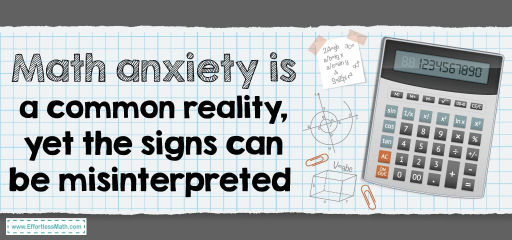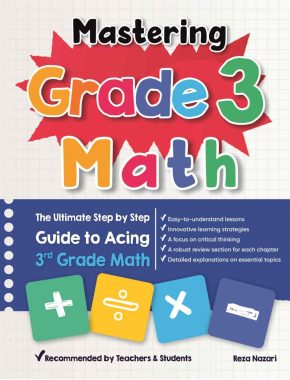Math anxiety is a common reality, yet the signs can be misinterpreted

Have you ever found yourself struggling in front of a math problem, trying to calm down, gain your focus, and understand what’s being asked? Many students experience these overwhelming feelings, often accompanied by symptoms like a rapid pulse, feeling blank, sweaty hands, shaking, and intrusive thoughts. When this happens, not only does it become difficult for the student to work through the exercise, but the initial discomfort can intensify depending on the pressure the student puts on themselves. And often — if not always — it’s more of a psychological problem than a math one.
A growing body of research, including studies from the Advanced Education Research & Development Fund (AERDF), is addressing this widespread issue. According to the AERDF, between 20% and 30% of students go through math anxiety, or math phobia. These feelings can range from stress and overwhelm to even fear when faced with a math problem. Clearly, this isn’t a fleeting issue that disappears as soon as you supposedly regain your focus. Neither is it a matter of being unprepared to solve, say, matrices or integrals – it goes deeper; it’s a mental and emotional struggle.
On a more positive note, the good news is that math anxiety can be managed—and even overcome. But to get over it for good, the first step is to recognize (and maybe admit) that you might be struggling with this condition before turning to oversimplified motivational messages on social media—claims like “math is already within you” or “just be confident”. This struggle is not rooted in confidence alone, but in persistent, underlying thought patterns. Let’s delve deeper into what might be going on and what so many students today feel.
Recognize math anxiety
Firstly, math anxiety is also known as:
- Math phobia
- Mathemaphobia
- Numerophobia
- Arithmophobia.
It can be difficult, if not impossible, to solve a problem correctly or work with numbers effectively when dealing with the emotional and psychological strain caused by math anxiety. Numberless other life challenges trigger the same anxiety, but some may make it easier to identify the disorder. Specialists from Legal Expert reveal that clients can often struggle with the anxiety of not winning a case, being left with damage they aren’t guilty of, or simply refusing to believe that they can obtain a hearty compensation if they were involved in a car accident caused by a traffic participant’s negligence.
When it comes to math anxiety, the symptoms vary in type and intensity, but it’s essential to recognize them to find solutions to overcome them. This is why we’re taking a look at some of the most common ones below:
Postponing and procrastinating
Postponing means lengthening your list of tasks, and while you may know this well already, fighting an entrenched coping mechanism can feel daunting, if not life-threatening. Procrastination and postponing can work as a coping mechanism, especially when it’s associated with stress, discomfort, and a need for perfectionism. Some students experience physical and mental panic when faced with math tasks — some can even blank out entirely. This panic interrupts cognitive processes and makes it nearly impossible to concentrate or remember learned information.
Delaying math tasks might temporarily relieve pressure, but the pressure eventually returns and can often resurge amplified. This results in rushed work, lower performance, and more negative experiences that retrigger anxiety.
Mental self-punishment
This habit, also known as negative self-talk and pessimistic, overcritical thinking, involves constantly telling yourself things like “I’m terrible at math”, “I’ll never get this”, or “I’m not a math person”. Such internal narratives don’t just reinforce fear and failure, but they can also block your ability to approach problems efficiently. In time, this kind of thinking becomes self-fulfilling, hindering progress to the point where you may possibly feel unable to get through any other subject successfully.
Missing motivation
Associating math with confusion, fear, or failure makes it increasingly difficult to feel motivated and engage with it. You might end up avoiding starting assignments at all, because this emotional toll feels unbearable, and not because you’re lazy.
Avoidance
Avoiding beginning homework or anything related to math in general is a common response to anxiety. Skipping regular study sessions can hinder you from gathering and storing notions, which are essential for building up knowledge. This makes the whole undertaking more overwhelming and can lead to a cycle of lagging behind and feeling even more anxious.
Difficulty remembering notions
Math anxiety can weaken memory, making it hard to recall even the most basic facts, whether it’s multiplication tables or formulas. It’s not that you haven’t learned them, but that anxiety creates a mental block that interferes with recollection in moments of pressure.
Focusing on memorization
Because anxiety discourages profound engagement, students often resort to learning things by heart—an unreflective memorization intended to help them get by. While this might help in the short term, it prevents genuine understanding and makes it harder to apply knowledge in unfamiliar contexts.
Give your thinking a break
After recognizing this pattern, which is the first step in your journey, you should implement a set of conscious efforts and strategies. Please avoid criticizing yourself and talking negatively, and concentrate on your strong suits. Oftentimes, people with anxiety only need to take a break from their intrusive thoughts and make room for better ones to emerge. Think of a Phoenix that rebirths from its ashes; it’s a deep process, but completely worth it. Rebrand that “blankness” that you might encounter in a form of impassivity to disorderly, discouraging thoughts.
Practice self-compassion
From celebrating even your smallest achievements to talking about these successes with your friends, there are many things you can do to encourage a habit of recompense. Treat yourself with compassion and kindness (and why not, some treat you adore), and you’ll fall in love with this sentiment, encouraging yourself to keep doing the good stuff.
Understand the concepts
Give up mechanical memorization and concentrate on understanding the underlying notions you’re facing instead of memorizing ideas. Suppose you’re already confident in your skill – it’s still a healthy step to brush up on essential info and basics.
Lastly, constant exercise can become your best ally.
What you might not find exciting right now, unless you’ve overcome math anxiety, is that you’ll need to work on math daily, at least for 20-30 minutes. Please avoid long gaps in studying, for they can prevent getting by with math. This discipline is a lot about exercise, critical understanding, and step-by-step knowledge building.
Frequently Asked Questions
How can I help my child with math anxiety before the test?
To help your child manage math anxiety before a test, start by ensuring they have a solid understanding of the basics through regular practice. Using resources like Worksheets can provide them with the confidence that comes from familiarity with different types of math problems. Additionally, discuss the feelings they experience around math openly and teach them calming techniques such as deep breathing or visualization to use before and during the test. It’s also beneficial to incorporate fun math-related activities into their study routine, such as exploring the Top 10 Grade 3 Math Books Inspiring Young Mathematicians To Explore, which can make learning more enjoyable and less stressful.
How do I help my child prepare for the math test?
To help your child effectively prepare for a math test, especially if they experience math anxiety, it’s essential to create a supportive and calm study environment. Break down the study sessions into manageable segments and use tools such as Worksheets to provide structured and clear practice opportunities. Additionally, incorporating fun and engaging materials like the Top 10 Grade 3 Math Books Inspiring Young Mathematicians To Explore can make learning more enjoyable and less intimidating. This approach not only helps in understanding math concepts but also gradually reduces anxiety by building confidence through regular practice and positive reinforcement.
How do you multiply fractions?
Multiplying fractions might seem daunting at first, especially if you’re experiencing math anxiety, as described in the discussion on the effects of such stressors. However, the process is straightforward once you understand the steps. To multiply two fractions, simply multiply the numerators (the top numbers) together and then multiply the denominators (the bottom numbers) together. For example, to multiply 1/4 by 1/2, you would calculate 1 x 1 = 1 for the numerator and 4 x 2 = 8 for the denominator, resulting in the fraction 1/8. If needed, simplify the fraction to its lowest terms. For more detailed guidance, you might find it helpful to visit our comprehensive guide on how to multiply fractions.
Related to This Article
More math articles
- Top 10 Free Websites for CHSPE Math Preparation
- How is the TABE Test Scored?
- 5 Best CHSPE Math Study Guides
- How to Scale a Function Horizontally?
- Direct Substitution in Limits: Everything you need to know
- When do the ACT Scores Come out?
- How to Add and subtract Fractions with Like Denominators in Recipes
- How to Multiply Decimals and Whole Numbers?
- How to Find Distance and Midpoint of Complex Numbers?
- Who is the Greatest Mathematician of all time?



















What people say about "Math anxiety is a common reality, yet the signs can be misinterpreted - Effortless Math: We Help Students Learn to LOVE Mathematics"?
No one replied yet.